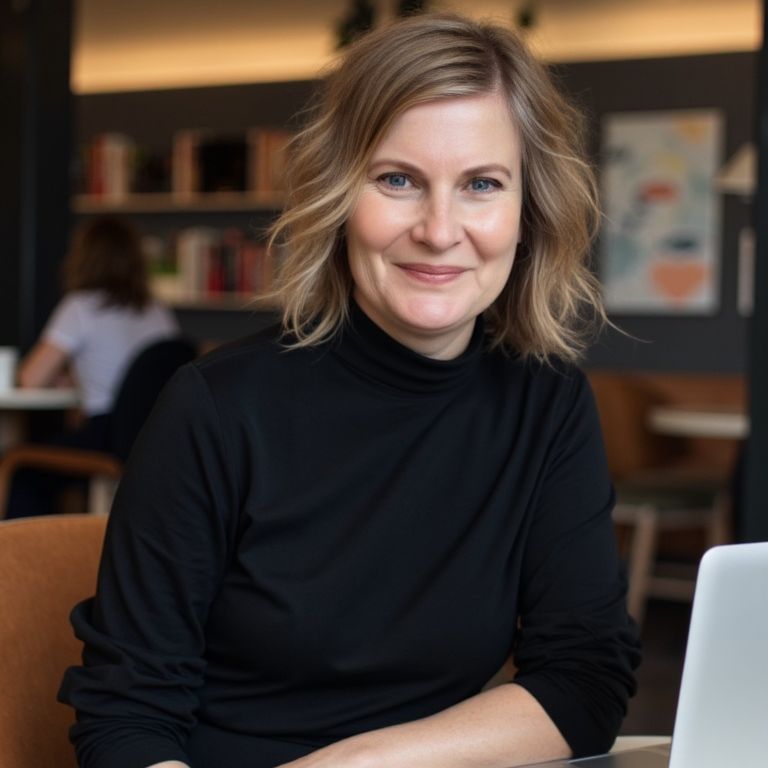How to be visible in challenging times (part 1: the inner work)
Oct 20, 2023
Something that's been a recent topic of conversation between myself and clients and students, and which I've been living through personally, is the issue of how to be consistently visible when life is challenging.
'Consistently visible' means different things to different people. For some it means showing up regularly on social media, for others it looks like showing up for your customers or your students, showing up for your family and friends, or showing up at work as an employee.
The discussion I've been having with people, hasn't been about having a one off bad day or lying in bed sick for a day or two, although the principles I'm going to share will help those times too. It's been about living through seasons or years that feel challenging. It's been about living in a world that feels chaotic and stressful, such that each time you establish a state of equilibrium, something else comes along to upset the applecart.
I started my business in one such season. It was 2008. I had chronic fatigue and couldn't work more than an hour at a time without then needing to sleep for about two hours to recover.
I wasn't receiving any financial assistance from the government, so I had very little choice but to find a way to earn money, despite my circumstances.
I had to train myself from the get-go to find ways to reach out to people, to be visible and to build my business, even with significant physical limitations.
This has meant that in the past few years, visibility - for me - has looked like:
- releasing weekly blog posts
- staying in weekly connection with the School of Visibility community via email and socials where I usually show up daily (often more regularly)
- producing a weekly podcast, facilitating weekly live events, and showing up regularly inside the online community space for our signature program
- producing a community podcast for the broader School of Visibility community
- hosting a number of whole of community events each year
- utilising advertising to reach new people
- facilitating 1:1 meetings with clients each week
- being interviewed on other people's podcast shows
- being a guest speaker at other people's live events and inside their programs, and
- being with my kids each morning as we prepare for the day and spending afternoons, evenings and weekends together, focused on family activities and priorities.
I've also continued living with mild, invisible disabilities, had two babies and two miscarriages, I've juggled homeschooling with running a business during lockdown, I've had long covid, I've had a few PTSD episodes which saw me take to bed for days at a time, and just recently, my mother died after a couple of weeks in an ICU ward.
Each challenging season has been arduous in its own way, and has found me either busy in my domestic arena, exhausted, grief stricken, or physically unwell.
And of course, in between each of those experiences, and often concurrently, myriad of global events were occurring which I have found distressing, upsetting, alarming or enraging. Sometimes all at once.
I don't feel that it's particularly unique to have had such experiences. I'm not sure I know anyone who hasn't had challenging seasons in their lives. Which means that finding a way to be visible, despite being in a challenging season, is a skill we all need to learn.
This is just as true for entrepreneurs as it is for employees. It's true for full time parents and for people caring for children with disabilities and/or elderly parents.
Life keeps calling on you to show up irrespective of your circumstances.
So, let's explore some principles, tactics and techniques I've employed over the years to stay visible while I grieving or healing or nurturing little ones.
THE INNER WORK
1. Look for those moments when the light is shining through
This one is about recognising that even in the most all encompassing experiences, there are moments of light and shade.
For about 15 years of my life, I struggled with clinical depression. It was a distressingly dark place. If you've not experienced it, the way the dementors function in Harry Potter - drawing all the joy and love and light from you - feels analogous.
And yet, for many years, I didn't have words to describe what I was experiencing. People didn't talk about mental health in the way they do now, so I didn't know I had depression. I would just hold on for dear life when the dementors came, and would stay in bed until they left.
Then one day - probably thanks to Oprah - I learned about gratitude journals. They're so common now that they sound almost trite, but they're commonly recommended for a reason; they work.
As I started using a gratitude journal, I noticed small moments of relief, combined with a redirection in my brain's point of focus. It started looking for the good and as it did, the bad faded just a touch.
I didn't realise it at the time, but I was training my brain to notice the moments when the light shone through.
Eventually I added a daily yoga nidra practice - another way of connecting to the light (in this case, the light of your own soul and the soul of the universe) - to my journalling practice. The combination of those two things kept my suicidal ideation at bay and moved me toward finding other resources and tools to help heal the originating cause of my depression. Steps I'm sure I wouldn't have taken had I not first learned to let in tiny moments of light.
2. Be fully present to what you're experiencing
In order to notice the light, you need to be fully present to what you're experiencing. Consciously building out a practice which keeps you noticing the present moment; the breath, the bedsheet, the breeze, the sunlight, the rain, the birds, the music, brings light into the darkest of moments. Not permanently and not usually in big bursts of joy, but there are hints there, for those open to them.
After I had my first miscarriage, I remember lying on my bed looking out the window, wondering if this meant that perhaps I wasn't going to become a mother in this lifetime. I was sad and crying for the loss of what might have been. I remember watching the clouds float through the sky, present to the peace inherent in that movement, when suddenly a very strong feeling came over me. The presence of my daughter. Not yet in form, but letting me know she wasn't lost, just delayed. That moment completely changed the way I viewed the miscarriage and a few months later I became pregnant with my first child.
More recently, I was walking in the cemetery where my Mum's ashes will be placed. Tears were gently rolling down my cheeks as I looked at all the people who were buried there and thought about all the grief their families must have experienced. In that moment, I started to think of grief not as something personal to me, but as something we all experience at one point or another. As a collective human experience. And I had an overwhelming sense of just how beautiful grief is. Anchored as it is in love, I saw the deeper truth of it; that grief is just another face of love and I felt deeply grateful for the sheer range of emotion we get to experience as human beings.
3. Be aware of the stories you're telling yourself
The inner stories we tell ourselves fuel our emotional state. The ones that keep things grim and depressed sound like, 'Things will never change. They have to be this way. The world is coming to an end.'
But without those stories, you're just you. You can be grieving and still laugh at a funny joke. You can allow for mixed and contradictory emotions. You can be angry without carrying the anger into every situation and interaction.
I experimented with this a lot when my kids were babies. After nights that involved very little sleep, I would watch my internal dialogue the next day. I noticed that it had a huge influence on how I approached the day. If the sleepless night was an experience I was replaying in my head, I would feel extremely tired and incapable of doing much. But if I didn't consciously bring the story of sleeplessness into my day, I was still tired, but I wasn't engulfed by a heavy energy. I didn't feel weighed down by it. I just felt like I should prioritise sleep at some point that day.
Your identity is shaped by the stories you tell yourself about who you are and what you're capable of. We each need to be careful about the identities we construct around ourselves. If your identity is one of being exhausted or run off your feet, your subconscious will try to show you the truth of that. But if your identity is simply that of a human being having human experiences, then there might still be times when you're run off your feet, but that won't be the only experience you're aware of. There'll be space for you to notice other experiences too. And that will help you build resilience in ways you otherwise wouldn't be capable of.
4. Ask only a little of yourself
When I was going through a divorce, many moons ago, I was very sad for a long time. I was also living alone for the first time in my adult life, which meant I had bills to pay. So taking an extended time off work to grieve wasn't an option. In that situation, I decided I only had the capacity to focus on three things; working, grieving and attending to the bare necessities involved in keeping me housed and fed.
Most of the time I worked during the day and cried at night. Sometimes I cried in the bathroom at work.
What I didn't do was expect myself to be social. I didn't distract myself by learning something new. I didn't try to break any new ground at work and I didn't try and please other people who wanted me to get over it and move on.
That would have been too much to ask of me. I didn't have the space or the energy for any of it.
Instead I honoured my grieving process and asked only one thing of myself; to keep showing up at work so I could pay my bills. For that season of grief, that was enough.
After many months of this, I found myself sitting on my balcony one day, looking at the trees and feeling the breeze. Involuntarily, a smile came across my face. I didn't force it and I didn't ask it of myself. It was just there.
That marked the beginning of a new season. In asking only a little of myself, I was able to focus on what mattered most and because of that, the light was able to find its way to me.
A similar thing happened when I started my business. Because I was physically unable to do much, I set an intention of trying to work two hours a day. One hour in the morning and one in the afternoon. Often that's all I was capable of. But occasionally I was able to double my working hours to four a day.
I didn't feel guilty if two hours was all I'd worked. I felt pleased. Excited that I was able to do that.
I definitely wasn't able to keep up with the daily, and sometimes multiple times a day, blogging schedule many people were recommending at the time, so I chose to blog fortnightly instead.
Because I wasn't comparing my workload to anyone else's and because I'd only asked a little of myself - what I felt to be genuinely achievable given my physical limitations - I was able to be consistent. To show up. To create the foundations of something new.
Within six months of taking that approach, I was working five or six or so hours a day and I've worked those hours ever since. I continue to nap in the middle of the day, and as a result, the days of relapsing for weeks at a time, where it was physically impossible for me to do anything in that time, are long behind me.
The workaholic/A-type person I was in my twenties and thirties became sick because she pushed too hard, and eventually it all became too much. There was too much stimulation, too much expectation, too many times when I ignored my tired body and worked silly hours. I partied too hard, said yes to work and social commitments that I should have said no to, couldn't slow down and definitely didn't know how to stop.
Turning all of that around, choosing less, and focusing only on what is realistic, given the season I'm in, has enhanced every aspect of my life and career. It has also become one of my most effective strategies for consistent, long term, sustainable visibility.
5. Notice your response to external stimuli
When I was very sick, what became apparent to me over time was that I wasn't responding well to external stimuli. It was taking me out at every turn. I had no capacity to be in complex environments without collapsing in on myself and losing all my power, even the power to stay upright. (By 'complex environments' I mean anything that involved more stimuli than a dark room. Light, noise, other people, even music. It was all capable of draining me completely and sending me back into a fatigued state for hours, days or weeks, depending on the level of stimulation I'd encountered.)
I knew only a little at the time about our energy centres called the chakras. I see now that this was solar plexus deficiency. Manipura - the solar plexus chakra - is the place of personal power. Because mine had been depleted for so long, it had no support to offer me when a challenge came my way. So low was my energy that almost anything became a challenge, even walking to the bathroom from my bedroom which sat adjacent to it.
As I worked on reclaiming my energy levels and my life, I became quite aware of the habit I'd developed of energetic collapse. I watched myself when personal and/or global circumstances threatened to unravel me. I consciously worked on the issues associated with Manipura (autonomy, willpower, self esteem, self worth, living one's own version of truth, individual commitment and strength) and I watched my personal power increase. I noticed my increased capacity to respond differently to circumstances outside of my control.
I started to respond more powerfully. With greater resilience.
I worked for many years on Manipura before I came to feel that the winds of change, of upheaval, of chaos could no longer unseat me. I did block clearing work, habit change work and belief change work. I kept stepping toward the most powerful version of me, even when the rest of me wanted to cower in safety. And eventually, I became strong in the solar plexus area.
I was sufficiently resourced to respond healthily to most situations, not without emotions and not without pain, but without collapse. Without losing myself or my centre. And when everything else is stripped back, that's the thing that makes you able to remain visible in difficult circumstances.
Visible not because you're willpower forces you to be visible and not because you're hiding behind workaholism, but because you're more resilient than most. Which makes you powerful indeed.
In the second article in this series I talk about the outer work that supports you to be visible in difficult circumstances. In the third article, I'll talk about the importance of the pause. 'The pause' being those moments when you decide to take yourself out of the game for a period of time. Not forever and not because you're hiding, but as an act of self care.
I wouldn't want anyone walking away from this article feeling that they must show up in every moment, no matter the circumstances. Sometimes a pause is necessary. Essential to making progress later. But before we talk about that, let's discuss the outer work. See you then. Samantha x





